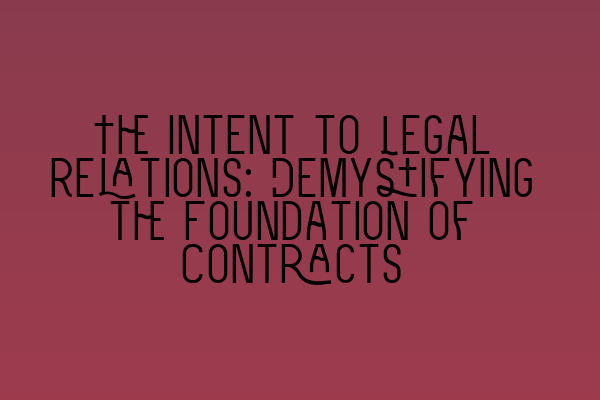The Intent to Legal Relations: Demystifying the Foundation of Contracts
A contract is the foundation upon which business transactions are built. It is a legally binding agreement between two or more parties that outlines their rights and obligations. But what makes a contract enforceable? What is the key element that determines whether an agreement can be upheld in a court of law? The answer lies in the intent to legal relations.
Before we delve into the intricacies of the intent to legal relations, it’s important to note that I am writing this article as a solicitor, providing expert insights into contract law. If you are preparing for the SQE 1 or SQE 2 exams, be sure to check out our related articles on SQE 1 Practice Exam Questions, SQE 1 Practice Mocks FLK1 FLK2, SQE 2 Preparation Courses, SQE 1 Preparation Courses, and SRA SQE Exam Dates for additional resources.
Understanding the Intent to Legal Relations
In contract law, the intent to legal relations refers to the intention of the parties involved to create a legally binding agreement. It signifies that both parties intend for their promises to be enforceable by law, and they understand the consequences of breaching the contract.
To determine whether there is an intent to legal relations, the courts assess the objective intentions of the parties, looking at the language used, the context of the agreement, and the conduct of the parties. While the courts take a holistic approach, they primarily focus on the objective manifestation of intent rather than the subjective intentions of the parties.
Elements of Intent to Legal Relations
There are several key elements that contribute to establishing the intent to legal relations:
- Offer and Acceptance: For a contract to exist, there must be a valid offer made by one party and an unequivocal acceptance by the other. This demonstrates the intention of the parties to enter into a legally binding agreement.
- Consideration: Consideration refers to the value exchanged between the parties. It is an essential element of a contract and demonstrates that the parties are willingly entering into a mutual exchange of promises or obligations.
- Intention to create legal relations: This element refers to the intention of the parties to engage in a legally binding agreement. It distinguishes social agreements, which are not legally enforceable, from contractual agreements.
Presumption of Intention to Legal Relations
In certain situations, the courts may presume that there is an intent to legal relations, while in others, it may need to be expressly stated or implied. The presumption of an intent to legal relations can be influenced by various factors, including the nature of the agreement and the relationship between the parties.
For example, in commercial agreements, there is a strong presumption that the parties intend to create legal relations. This is because businesses typically operate with the expectation that contracts will be enforced to protect their interests. On the other hand, social agreements, such as those between friends or family members, are presumed to lack an intent to legal relations, unless there is evidence to the contrary.
Impact of the Intent to Legal Relations
The intent to legal relations is a crucial aspect of contract law as it determines whether an agreement can be enforced by a court. Without the intent to create a legally binding agreement, the parties are not obligated to fulfill their promises and cannot seek legal recourse for a breach.
Contractual disputes often arise when one party argues that there was no intention to create legal relations. In such cases, the court meticulously examines the circumstances surrounding the agreement and the conduct of the parties to determine the true intent.
Conclusion
The intent to legal relations serves as the foundation of contracts. It establishes the parties’ intention to enter into a legally binding agreement and forms the basis for enforceability. By understanding the elements and implications of the intent to legal relations, both businesses and individuals can ensure that their agreements hold weight in the eyes of the law.
If you’re preparing for the SQE 1 or SQE 2 exams, it’s important to have a solid grasp of contract law concepts, including the intent to legal relations. Be sure to explore our related articles on SQE 1 Practice Exam Questions, SQE 1 Practice Mocks FLK1 FLK2, SQE 2 Preparation Courses, SQE 1 Preparation Courses, and SRA SQE Exam Dates for comprehensive exam preparation.
